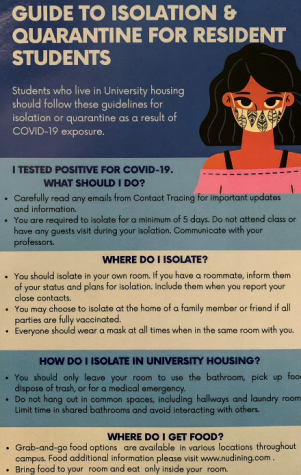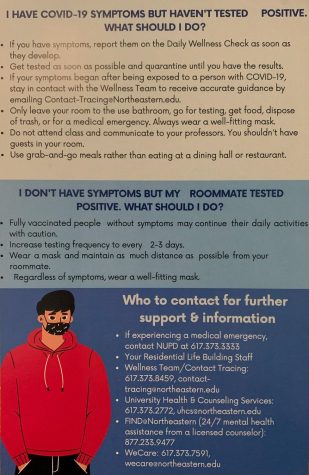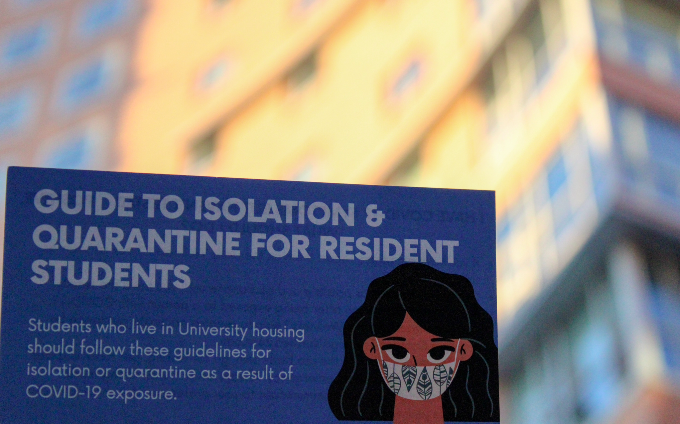A new approach to COVID-19: Northeastern moves toward treating COVID-19 as endemic, closes wellness housing
February 1, 2022
Northeastern is slowly moving closer to treating COVID-19 as as a regular part of day-to-day life, and in turn, its policies and practices surrounding COVID-19 are changing.
“As we move into this endemic phase of the pandemic, our job is to continue to control Covid effectively, not let Covid control us,” wrote Ken Henderson, Northeastern chancellor and senior vice president for learning, in a Dec. 23, 2021 email. “A key part of this will be less emphasis on positive case counts and laser focus on preventing severe illness and hospitalizations. In a community that is fully vaccinated, and boosted, our strategy should not be driven by positive cases.”
As opposed to a pandemic, which is an outbreak of a disease often covering whole countries or the world, endemic disease is something that is constantly present, according to the Centers for Disease Control and Prevention, or CDC.
In an interview with The News Jan. 26, Henderson said it has become clear that COVID-19 will be around for the foreseeable future, which influenced some of Northeastern’s rules for this semester.
Brandon Dionne, associate clinical professor at Northeastern’s School of Pharmacy and clinical pharmacist in infectious diseases at Brigham and Women’s Hospital, said that Northeastern’s shift to an endemic approach may have been premature, but it’s hard to know.
“They’ll be right eventually. Question is, are they right now?” Dionne said. “I don’t have a good answer for that, and anyone who tells you that they know is lying.”
A change in guidance
One of the biggest changes this semester brought was the closure of wellness housing, which was available for students who tested positive on campus since early in the pandemic.
Henderson announced the university would close wellness housing in an email to students Jan. 13. Unless students are able to arrange for alternative housing, like going home or getting a hotel room, this change means students who test positive for COVID-19 will be isolating in their dorms with their roommates.
In the interview, Henderson explained that emergency housing would be available for students at increased risk, and they can apply for this housing through We Care or Residential Life.
Also included in the new policy changes are shorter quarantine periods consistent with the CDC guidelines and a grab-and-go meal plan for students who test positive.
Henderson explained in the Jan. 13 email that part of the decision to close isolation housing was due to the fact that a majority of the Northeastern community is vaccinated against the virus, which means they will likely experience limited symptoms if any at all.
“The university’s vaccination and booster requirements necessitate a shift in our collective thinking,” Henderson wrote. “While the omicron variant has led to substantial increases in transmission, the most current data demonstrates that the vaccines remain remarkably effective in reducing the risk of severe illness. … The vaccines allow us to begin shifting our mindset and to approach Covid much more like a cold or flu season, which tends to be low-risk for healthy, vaccinated individuals of a college-aged demographic.”

In the interview with The News, Henderson validated student concerns but stressed that the university is shifting its thinking due to the low risk of severe illness.
“The concerns are completely understandable,” he said in the interview. “Really what we’re looking at — and this is not just [on] an individual level, but on the public health scale level — is a mind shift into the place where there will be a risk of infection, but the risk of severe illness is very low. And that is completely understandable, and I empathize with individuals who have concerns about this, but the game has changed with vaccinations and boosters in place and a less severe variant that dominates the infections.”
In a shift from earlier practices, If a Northeastern community member tests positive at the Cabot Testing Center, they will be notified via email, according to the spring 2022 FAQ page. Previously they would receive a call from the Northeastern Wellness Team. After receiving notification of a positive test, they should start their five days of isolation, counting from the date of their positive test or the onset of symptoms, whichever is earlier.
 “Isolation typically lasts for five days followed by five days of wearing a mask when around others (both indoors and outdoors), but the exact duration may extend to 10 days based on the person’s symptoms and the date of their positive test,” reads the Isolation and Quarantine information page.
“Isolation typically lasts for five days followed by five days of wearing a mask when around others (both indoors and outdoors), but the exact duration may extend to 10 days based on the person’s symptoms and the date of their positive test,” reads the Isolation and Quarantine information page.
If a roommate, who is presumed negative, needs to be in the same room for any period of time, everyone should wear a well-fitting mask, according to the page. Grab-and-go food is available in campus dining halls for those in isolation.
According to an informational sheet delivered in dorms, for fully vaccinated students whose roommates test positive, Northeastern says if they don’t have symptoms they can “continue their daily activities with caution.” Those students should also increase testing frequency to every two to three days, wear a mask and maintain as much distance as possible from their roommate.
‘How do you expect people to not be upset at this?’: Students voice concerns
One group feeling blindsided by these changes were students working as resident assistants, or RAs. In a spring training for RAs, questions regarding the new policies were largely ignored by ResLife staff, according to an RA who wished to remain anonymous for fear of professional retaliation.
“I don’t think any of ResLife for some reason anticipated this, which seems kind of unfathomable to me because how do you expect people to not be upset at this?” the RA said.
In addition to concerns about a potential spike of COVID-19 positives in student housing, the anonymous RA explained that a rise in cases will burden students who work for ResLife with more responsibilities if residents or other RAs get sick. This includes extra shifts in the RA office and doing more rounds. The university, the RA said, has also tried to push for more in-person programming, something that they view as very irresponsible.
“This is going to hurt people. The effects of long COVID are still just being discovered, and the whole neurological damage, and brain fog, and smell and taste loss … it’s just that this is going to be a nightmare,” they said.
The rise of the Omicron variant, which has proven to be more transmissible, even among vaccinated individuals, than earlier iterations of the disease, has some in the Northeastern community alarmed about the changes.
The RA told The News that RAs expect to hear increased calls from residents and complaints from their parents as students get adjusted to the beginning of the semester. RAs also are predicting an uptick in roommate conflicts due to COVID-19 related issues.
“It’s really frustrating and disheartening to watch the university take away protections for not just RAs but students at large,” they said.
Lauren Su, a first-year pharmacy major who lives in Stetson East, is deeply worried about these updated guidelines.
“I feel like since Northeastern has been open since the pandemic in 2020 that this would kind of happen, but I wasn’t expecting getting rid of the wellness beds and also like staying in the dorm when your roommate is sick or when you’re sick,” she said.
Another area of concern for Su is sharing communal bathrooms with those who test positive. Su said she believes the university needs to be more clear about how the new procedures will work.
“I have some friends living in the same dorm as me, and I think we all voiced the same concern of communal bathrooms mainly and also how we’re supposed to get food [if we test positive],” she said. “If we have COVID, the grab-and-go system is good in the sense that you’re not eating in the [dining hall], but also if we have COVID, we don’t want to potentially spread it to other people.”
The science behind COVID-19 isolation
While removing isolation housing for students who test positive for COVID-19 exposes roommates to the disease for a longer period of time, Dionne, a clinical pharmacist in infectious diseases at Brigham and Women’s Hospital, said the risk isn’t much worse than if isolation housing was widely available.
“You can actually transmit COVID before you have symptoms. So if your roommate has COVID, it’s possible that you could get it without them ever even knowing they’re sick if they’re pre-symptomatic and shedding virus or even if they’re totally asymptomatic,” Dionne said. “Just living with other people already kind of puts you at increased risk.”
Because Dionne, an associate professor, doesn’t live on campus, he said he feels more removed from this issue than many students are. Dionne acknowledged that students isolated in their own dorms do expose their roommates for slightly longer, but for the most part, because of the university’s vaccine requirement, the Northeastern community is as well-protected as people can get.
“If you’re all vaccinated, in theory, that should shorten the amount of time that you’re symptomatic, shorten the length that you’re shedding virus and can transmit and reduce the viral loads,” Dionne said.
Exposure to COVID-19 follows a dose-effect — the more you are exposed to it, the more likely you are to catch it. Research has shown that Omicron typically leads to slightly lower viral counts, so isolating with someone who has tested positive for Omicron is less risky than it was with past variants.
Dionne had some advice for students whose roommates test positive. COVID-19 doesn’t transmit as much on surfaces, so Dionne said cleaning protocols aren’t the most important thing. What is important, he said, is airflow. Dionne said that any way to bring fresh air in is good, especially if someone needs to go into the room the sick person has been in. He also emphasized that well-fitting masks are important in containing the spread.
Dionne said, from a scientific standpoint, it appears that Northeastern’s approach now is more about limiting risk, as opposed to completely eliminating COVID-19.
“They were trying to completely eliminate the risk when things were primarily Delta [variant] and we thought maybe we’ll get through it,” Dionne said. “I think now they’ve shifted from trying to eliminate or greatly reduce risk to now just minimizing it as much as they can without drastically uprooting people.”
As it is still early in the semester, we don’t have a full picture of what COVID-19 on campus looks like for this spring, Dionne said. According to The News’ testing dashboard, on Jan. 28 there were 50 positives, with a seven-day positivity rate of 2.62%.
During the move-in process, it is likely that some students brought COVID-19 with them, possibly leading to elevated case counts.
Dionne said he is happy Northeastern is still requiring weekly testing but said students shouldn’t be afraid to test more often if they are exposed.
“I think we will know better once everyone is back and we know what the community transmission looks like. If there’s a significant amount of community transmission, you probably should be testing every two to three days, just to make sure,” Dionne said. “There’s certainly no harm to doing it a little more frequently, especially once you first moved back onto campus … and if you come in contact with some COVID.”
Though no one can say for certain how the spring semester will go, Dionne is optimistic that students will continue to be careful and abide by mask mandates and other precautions.
“My hope is that this will actually lead us to being more vigilant about respiratory infections in the future and that people will not come into work or … class when they’re sick and that [we] will respect sick time a lot more than we did previously,” Dionne said.

